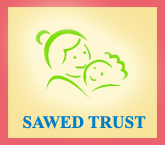
Health Programmes:
Delivering healthcare to over a billion people is a very complex challenge. SAWED works to secure accessible and quality maternal and child healthcare among marginalised communities. We work towards identifying the root causes of healthcare challenges, provide innovative solutions, and help implement secure and quality healthcare services in our target districts. SAWED believes that a healthy mother and a healthy baby is the route to a productive, developed nation. Hence, SAWED has specially focused upon providing comprehensive solutions to address public health problems. We promote essential new born care and immunisation, reduce malnutrition, prevent infant and maternal deaths and protect those affected by or susceptible to HIV/ AIDS and TB. SAWED works closely with its stakeholders to achieve good health care for everyone.
Mobile Health Clinic:
The bridge that connects the community with doctors and development personnel on a weekly basis is the Mobile Health Team. The MHT is a five-member team comprised of two social workers, a paramedic, nurse and one doctor. The MHT conducts home visits to assist VHWs in more complicated matters, as well as collects vital statistics for healthcare monitoring. The Social workers advise on social and economic initiatives led by the Women’s SHG, as well as meeting regularly with Farmers’ Clubs, and Adolescent groups.
Eye Camps:
Eye camp is an activity in which a medical team visits the village and examines people’s eyes to detect any problems. Those with eye problems are offered the necessary treatment, either at the camp itself or referred to nearby hospital, depending on the nature of the problem. Free eye camps are a major step in the campaign against ‘needless blindness’ in developing countries. They provide a link to the rural masses by reaching out, seeking the needy patients and restoring their vision – at no or low cost to the patient. SAWED regularly conducting such camps in the remote areas/villages of Tamilnadu.
SAWED school eye health screening programmes:
It is essential for school children to have not only good health but also good eyesight in order to be successful in their studies. Children with poor eyesight will be poor performers at school. It is necessary for such children to be identified and have their refractive errors corrected to restore good eyesight. Other common causes of blindness in children include vitamin A deficiency, and amblyopia. School eye health screening programmes can catch eye defects before they cause irreparable harm.
HIV/AIDS awareness Programme:
SAWED engaged in creating a positive impact through a collective movement of rural population. This project is aimed at spreading awareness about HIV-AIDS in villages through cultural performances. By using street theater, music and folk arts of native origin, this program tries to disseminate information about health issues in a way that can be understood by common laymen. In the process, it also tries to identify high risk individual through health surveys and tests them for HIV-AIDS subsequently.